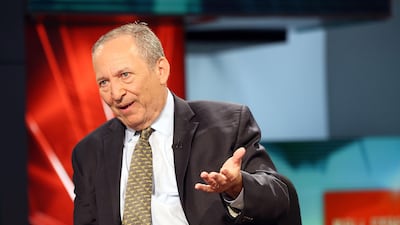When former UK prime minister Tony Blair organised a conference in London last week to promote new policy ideas for a radical centre in politics, he chose erstwhile US treasury secretary Larry Summers as the keynote speaker.
Mr Summers is enjoying a revival of his reputation for opposing US President Joe Biden’s economic programme because it would stoke inflation. But his latest analysis was deeply disturbing – and not for the reasons he would wish. The American economist struck an off note, one that displayed why centrist politicians haven’t been giving the answers that can resonate in the West.
Indeed, for almost a decade, the moderate politicians' tool of using obvious logical reasoning to propel politics hasn’t paid dividends. And in the face of double-digit inflation, rising interest rates and ravaged government finances, the signs are that centrists such as Mr Summers still don't have the solutions the voters are craving.
One reason was that Mr Summers's projected outlook for the big western economies made for hard listening. “The lesson of economic history is largely that soft landings don't happen when you have very low unemployment and you have very high inflation,” he said at Mr Blair’s event. “You get recessions within the next two years. Sometimes the inflation hurts financial conditions and erodes people's income so they don’t spend and you get recessions.
“Sometimes the central bank has to take strong actions to contain the inflation and you get recessions. I think the likelihood is that there will be a recession within the next two years.”
He did go on to describe an oncoming recession as something that could be capitalised on by the political elite. “We need to be prepared to use that recession as an opportunity,” he said. “The best time for people to be trained is when they would otherwise be unemployed – not when it's taking them away from jobs.”
An article in The Wall Street Journal earlier in the week took issue with Mr Summers's view that this is the kind of recession we have to have. Arthur Laffer and Stephen Moore, both experts on economics, wrote that the best way to head off trouble wasn’t by steeling for downturn. It was to cut taxes, regulations and tariff barriers, as well as taking the monetary measure of selling down public debt.
Speaking later in interviews, Mr Blair noted how lucky he had been in own heyday, because inflation wasn’t much of an issue and there was no large-scale demand for strikes – as is currently the case in the UK.
Another speaker at Mr Blair’s event, British economic expert Paul Johnson, provided an analysis on the country’s upside-down economic structure, pointing out that retired people now earn the same amount annually as those in the prime of their working lives. He noted that structural reforms are needed to reverse this but the political class refuses to take these on because of the potential of a backlash from older and wealthier voters.
At a separate briefing by Citi Global Wealth, there was some insight for me into how these accumulated problems are handicapping today’s economy and markets.
David Bailin, the chief investment officer, does not think there is going to be a recession in the top economies, though he acknowledges that profitability of the type of firms his company invest in is taking a big hit. Mr Bailin’s great fear is that central banks, having inflated the economies but mistimed their interventions, are going to pursue the wrong policies on the flip side.

From his perspective, the current inflation problem can be defined in two parts. The first is inflation that comes from wage/price spirals that is often self-sustaining. A second type of inflation comes in the form of shocks provided by energy and food prices for reasons that are outside the central banks' control. Overall he thinks up to two-third of the current inflation comes from this latter category. He also adds that the supply chain shocks – stemming from Covid-19 disruptions to goods such as bicycles – is over and the shelves are full again.
Therefore, Mr Bailin worries that projected higher interest rates in Europe and the US will come at a time when shoppers are cutting back and stores are full and, thus, can turn a downturn into a regression. “We really are concerned that the tipping point to a recession is not due to anything other than what the central banks decided to do,” he said.
Looking at Citi Global Wealth’s network of retail investors in the UK and the UAE, the team sees clients shying away from risky investments to access the extra income from dollar deposits. But caution is not something confined to the smaller investor. Among the group’s European clients one-fifth of the holdings is in cash, perhaps 10 times the advisable allocation.
None of this should be a cause for wonder. The moderates are tuned for inevitable doom and reforms are nowhere on the horizon. A kind of doom loop forms.
Centrism is necessary so that politics delivers on its promise of an improved social contract. Right now, however, it is hog-tied by the dismal fear that things will only get worse.


